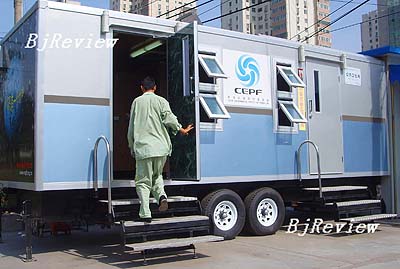|

In China, the words for "go to the toilet" can also be interpreted as " need a convenience," but it is far from convenient for Beijing residents to find a public toilet.
"Our community is very big but it is equipped with only four public toilets, of which one has been torn down and another one closed," said Cheng Yi, who is a tour guide and resident of Fangzhuang Community in Beijing.
Being a tour guide, on many occasions Cheng has had to lead groups to nearby hotels or restaurants in order to find a toilet. Cheng is concerned that the "convenience" shortage might prove a problem when people from all over the world flock to Beijing for the Olympics.
"There are public toilets in hutongs, but most of them are stinky and unclean, how we are supposed to let our foreign guests go to toilet like that?" he asked.
What comforts Cheng is that over the last three years the Beijing Municipal Government has invested an unprecedented 400 million yuan ($54 million) to reconstruct old public toilets and build new ones.
"Beijing began a massive toilet reconstruction project in 2005 and new ones are being built at 1,000 each year," said Ma Kangding, an official with the Beijing Municipal Utilities Administration Commission overseeing the project. According to Ma, who has been dealing with toilet construction for 17 years, the 2008 Beijing Games will provide a golden opportunity for the city's "toilet revolution."
One of the missions for Ma and his co-workers is to replace the old-fashioned groove-like flushing toilets with separate ones. By the end of 2007, more than 5,000 public toilets within the city's 5th Ring Road will have been updated. "Public toilets are no longer hard to find and their conditions are better than before," said Ma.
The renovation measures have included installing hi-tech devices to save water and neutralize odors. A batch of high-standard public toilets have already come into existence. There's a two-floored one close to Zhongshan Park that covers an area of 600 square meters, which costs 2 million yuan to build.
There will be 700 toilets in Olympic venues by the time the Beijing Games start and an additional 800 nearby.
The average person can walk 300-500 meters in 5 to 10 minutes, so the distribution of public toilets should be within this range. This objective is achievable for main streets by the Olympics but on smaller roads the average distance between two toilets will be 750 to 1,000 meters.
"To build a toilet is much easier than to find the right location," according to Ma. The city has a strict building layout, so to insert toilets that are both practical and pleasing in appearance is no easy job. The city's biggest street, Chang'an Avenue, was supposed to have 33 more public toilets, but after much research and negotiation this was shrunk to a dozen.
Though many are longing for more public toilets, few want these toilets to be located in front of their home. Beijing already has regulations saying that large hotels, catering premises and public office buildings should have public toilets that should be free to use no matter whether people are customers or not, but some bosses disregard this regulation. "It will create a problem for us to clean the toilets if our toilets are open to all," some claim. Besides, many people feel uncomfortable using restaurant toilets.
Taxi drivers face the risk of being fined for unlawful parking if they stop to go to the toilet or to let a customer go. In light of this, the government is thinking about designing a temporary parking zone for drivers. Taxis will also be equipped with GPS devices, which will enable drivers to find the nearest public toilets.
"At present the construction of Beijing's public toilets is on a level with developed countries; but management after construction lags far behind," noted Ma, adding that Beijing is trying to explore social resources by contracting the management of the public toilets to companies.
"At the same time education on properly using toilets has been enhanced," added Ma. The good image of updated toilets won't be maintained if the users don't change their poor habits. Some users still leave their shoe prints on the cushions of the toilet seats. Although many public conveniences have baby toilets specially designed for babies, some citizens don't want their babies to use them as they think they might not be clean enough. |